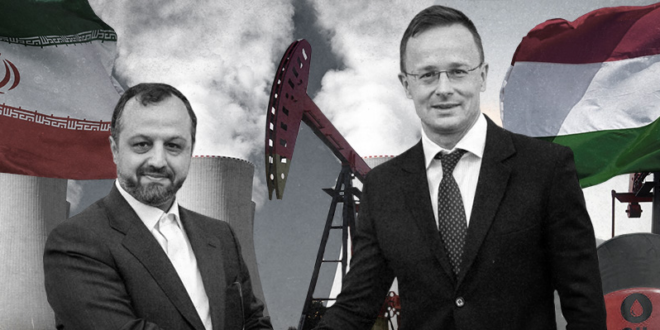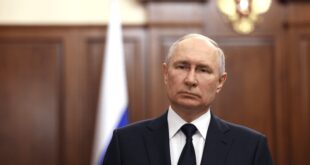As Budapest actively implements its own “Look to the East” policy, Tehran will find a potentially useful partner in Europe.
Upon signing the protocol of the third session of the joint commission for economic cooperation between Iran and Hungary on 16 November, Hungarian Foreign Minister Péter Szijjártó expressed support for Iran’s right to the peaceful use of nuclear energy.
He also wrote on his Facebook page that the Hungarian government intends to integrate Iran into the international cooperation system and that Budapest plans to expand economic cooperation with sanctioned Iran with the aim of “normalizing the situation.”
After regaining power in 2010 and forming a government, Hungary’s ruling Fidesz Party defined its main priority as improving the nation’s economy, creating jobs, and attracting foreign direct investment (FDI). Budapest gradually moved to provide the necessary legal platforms through which foreign companies could make investments, especially in the industrial sector.
Arguably, Hungary’s foreign policy is therefore heavily focused on the development of economic relations with foreign partners to maintain and continue economic growth and attract more FDI.
Between 1989 and 2019, Hungary received approximately $97.8 billion in FDI, mainly in the banking, automotive, software development, and life sciences sectors. The EU accounts for 89 percent of all in-bound FDI.
Hungary’s “Eastern Opening” policy
However, the presence of eastern countries and the increase in the volume of trade and investment in Hungary is particularly noteworthy. This presence is due to Hungary’s “Eastern Opening” policy, which has become one of the principles of the country’s foreign policy and economy since 2012.
The global financial and economic crisis of 2007-2009 and its impact on the European economy was one of the catalysts for the Hungarian government in launching this initiative. As a result of this policy, China has become Hungary’s fifth most important trade partner with bilateral trade volume in 2020, having increased by more than 25 percent year-on-year.
Regardless of the debatable success of this policy, there are two points which make Hungary willing to continue this policy resolutely:
First, Hungary’s location as the gateway to Western Europe positions Budapest as an important access point to those markets, even potentially a logistics and transportation hub between the EU and Asia.
Second, is Budapest’s assumption that a genuine representation of Hungarian national interests is only possible once the country attains more global visibility and is able to parlay that into support from relevant international and regional players.
Iran and Hungary
Iran-Hungary relations cannot be separated from Budapest’s key “Look to the East” policy. Hungary has a special view of the east, including West Asia, and considers Iran to be an important strategic player in the region.
“The Hungarian government has always supported Iran’s balanced approach in international forums and the further development of bilateral ties,” Péter Szijjártó said in July.
The cooperation between Budapest and Tehran has been prioritized in several fields: energy, trade, migration, student exchanges, and support for Iran’s nuclear negotiations.
In the economic sector, Iran and Hungary have signed three economic cooperation protocols to date. Most of the cooperation is in the field of agriculture, animal husbandry, and healthcare. Moreover, the volume of economic trade between the 2nd and the 3rd Joint Economic Cooperation Commission has increased by 55 percent.
Following a recent meeting in Budapest, Iran’s Finance and Economic Affairs Minister Ehsan Khandouzi announced the two countries’ plans for boosting their annual bilateral trade to €100 million. In addition, Iran and Hungary signed a memorandum of understanding in late 2021 to expand economic cooperation in the fields of water treatment, seeds, power plants, animal feed and building materials, and joint investment opportunities.
“We would like Iran to return to the system of peaceful collaboration within the international community as soon as possible. We believe that economic cooperation may be the first step in this return,” Szijjártó said on his last visit to Iran.
In addition to economic cooperation, there are 2000 Iranian students in Hungary, and the government plans to grant scholarships to 100 Iranian students. Budapest also appreciated Iran’s role in preventing the flow of migrants to Hungary, especially Afghans, and politically supports Iran’s acquisition of peaceful nuclear technology.
Capitalizing on Budapest’s strained EU ties
From Iran’s point of view, Hungary can help it to bypass sanctions, enter global markets, and act as a mediator in easing belligerent European policies against Iran. Budapest’s tension with the EU in adopting policies that, in some cases, violate the EU’s own procedures and regulations, also incentivizes Iran to deepen its strategic partnership with Hungary to help further Tehran’s interests in Europe.
Hungary and the EU have been clashing for years on issues ranging from judicial independence to media freedoms and refugee rights. In September, several EU lawmakers declared that Hungary had become “a hybrid regime of electoral autocracy.”
In turn, Budapest has repeatedly accused Brussels of undermining its national interests and meddling in its internal politics. In 2018, Hungary passed a law in that criminalized helping illegal asylum seekers, which punishes violators with up to a year in prison. The EU strongly condemned the new legislation, but Hungary stood firm.
An eastward outlook
The opposition of the EU to Hungary and the adoption of its closer alignment with the east has prompted Budapest to take a positive, more proactive view toward countries like China, Russia, Iran, and to some extent, Turkey.
Currently, Hungary enjoys strong economic and energy relations with Russia. By opposing a visit by the special rapporteur on human rights to Russia, Budapest became the only European capital to take this stance.
While Hungary voted in favor of two 2014 resolutions against Russia over Ukraine, it has also opposed an €18 billion EU aid package to the embattled state.
Budapest is highly dependent on Moscow for energy supplies with 85 percent of the country’s gas and 65 percent of its oil supplied by Russia. Unlike the other energy dependent EU members, Hungarian authorities are strongly and openly opposed to sanctions against Russia, particularly in the energy sector.
In regard to 2022 energy shortages, Hungary’s foreign minister has even encouraged Europe to look to Tehran: “Iran’s stronger entry to the global energy market is in line with the interests of the world’s entire countries and nations.”
On the issue of Sweden and Finland joining NATO, Hungary – like Turkey – has declared its opposition to the plan, which is essentially opposition to the expansion of NATO in Europe or to the east.
Hungary’s common positions with Russia and the eastern bloc inevitably overlaps with some of Iran’s policies. By coordinating with both Europe and West Asia, deepening strategic relations between Budapest and Tehran can become a means to advance their mutual goals and interests.
At the same time, Hungary will be wary of potential western sanctions if it is viewed as growing too close to Iran.
 Eurasia Press & News
Eurasia Press & News




